- Home
- Ransom Riggs
The Desolations of Devil's Acre Page 2
The Desolations of Devil's Acre Read online
Page 2
Born again.
I am become Death, destroyer of worlds.
However bad it was or would be, I knew one thing: The world needed Noor Pradesh. She was one of the seven. One of the peculiars whose coming was foretold, who could emancipate peculiarkind—from Caul?—who could seal the door—to what? Hell?—and as bizarre as it all sounded, it was no more bizarre than the parts of the Revelator’s prophecy that had already come to pass. I was finished doubting it. Finished doubting my own eyes, too.
This was no dream nor the last reverie of a dying mind. I was even more certain of it as I tripped over the track of the sliding door into the living room. The house was just as my friends and I had left it the last time I’d been here, a few weeks ago: hastily neatened and mostly empty, the books my father hadn’t thrown away placed back onto shelves, trash that had littered the floor stuffed into black plastic bags. The air was stale and suffocating.
Noor pinballed from corner to corner looking for V. She tore a dust sheet off the couch, then flung herself over the back to look behind it. I caught her at the window—started to say, “Noor, wait”—when a crack of thunder cut me off and made us both jump. We looked out through the rain-blurred glass. The yard was strewn with trash. The houses across the cul-de-sac were shuttered and dark. A dead neighborhood.
And still.
“That wight probably had friends,” I said. “More could come any minute.”
“Let them come.” Her eyes were shards of ice. “I’m not leaving until we search every room. Every broom closet.”
I nodded. “Me neither.”
There was no one in the bedroom. No one under the bed. It felt silly to get down on our knees and look, like kids checking for the boogeyman, but I did it anyway. There was a rectangular impression in the carpet where my grandfather had kept his old cigar box, the one I’d found after he died, filled with the snapshots that would forever change the course of my life. But there was no V, dead or alive. Not in the closet. Not in the bathroom, where Noor tore back the shower curtain to find only a bar of withered soap.
There was nothing in the guest bedroom but a stack of unused moving boxes and spots of blackening mildew on the carpet. I could feel Noor’s desperation mounting. By the time we came to the garage she was calling out for V, which was killing me, splitting my heart by the seams. I flipped on the lights.
Our eyes scanned a jumble of discarded junk and fix-it projects my grandfather never finished: two ladders, each missing a step. A boxy old television with a cracked screen. Coils of wire and rope. My grandfather’s workbench, piled with tools and woodworking magazines. I saw my ghost and his there, shoulder to shoulder under the pooled light of a gooseneck lamp, stringing red yarn across a map with pushpins. The boy thinking all the while it was only a game, a story.
The storm’s shifting pressure rattled the garage door, jolting me back into the present. I saw my grandfather’s gun cabinet, the only thing in the garage large enough to conceal a person. Noor moved first, got there before me, and yanked the handles. The doors popped open an inch and then a chain pulled taut. Someone, almost certainly my dad, had padlocked the cabinet. Through the crack we could see a row of oiled rifle barrels. The weapons that might’ve saved my grandfather, had I not taken the key.
Noor drew her head back in surprise, then turned without speaking and ran into the house. I chased her to my grandfather’s office, the only room we hadn’t searched yet. The room where Olive had stomped her feet to find a hollow-sounding spot, then rolled back the rug to discover a door in the floor and a bunker below it. A bunker that V probably knew about—and might’ve even known the code to enter.
I tried to tell Noor, to shout above the storm’s rising roar and Noor’s own shouts—Are you here? Mama, where are you?—but she couldn’t hear me and wasn’t looking, was shoving aside Abe’s empty desk and running to bang open the tiny closet, so I gave up and wrestled back the heavy carpet on my own and tried to remember where the hinged floor panel was, but I was too frantic and couldn’t seem to find it.
There was no V in the room. I decided there was no V down in the bunker, either. I couldn’t imagine her escaping here only to shelter in the bunker and shut us out. So when Noor ran out of the room I stood up and chased after her.
I found her still as a statue in the middle of the living room, breathing hard but focused. She beckoned me closer.
“What if we all came through together?” she said quietly, her eyes locked on a point in space at the edge of the room. “And we were the same distances apart that we’d been on V’s porch.” She raised her arm. “There. That’s where I woke up.” She was pointing at the corner where my grandfather’s worn recliner sat. On the floor beside it was a burned outline, vaguely Noor-shaped. “And you woke up there.” She pointed through the door to the screened porch, where my burned outline was disappearing under a spreading pool of the wight’s blood. “That’s exactly how far apart we were on V’s porch. You were handcuffed to the rail over there and I was over here.”
I felt a spark, a quickening. “And V was out in the grass.”
We both looked up at once, our eyes darting to the flapping porch screen, the overgrown yard, the tall grass by the woods where the man in the yellow raincoat had paused and looked down.
“Right there,” I whispered.
Our bodies unlocked. Together we bolted out into the storm.
V’s body looked like it had been swallowed by the earth and spat out again. She lay twisted in the grass like a tossed-away doll, arms splayed cartoonishly and legs tangled beneath her. Her gray hair was knotted and clotted with mud, her red cardigan and black dress soaked with blood and rain. She’d lost a boot, and the patched woolen sock on her unshod foot made me think, incongruously, of the wicked witch in The Wizard of Oz, the one who gets pancaked under Dorothy’s house. I locked my focus there, on what I remembered of that old acid trip of a movie, on the worn toe of V’s striped sock, so it wouldn’t wander north . . .
how many times had she patched that sock
. . . to the dark hole in V’s chest . . .
a thing
she is just a thing now
. . . to an open mouth pooling with rain . . .
there’s no place like home
Noor was crying. Her head was bent forward, hair covering her face, but I could see her chest heaving. I tried to put my arms around her but she wrenched away suddenly.
“I did this,” she whispered, “it’s my fault, it’s my fault, it’s my fault.”
“It’s not,” I said. I tried again to wrap my arms around her and this time she let me. “It isn’t.”
“Yes, yes, it is,” she whispered. I held her tighter, tighter. Her body shook. “She was safe in that loop for so many years. And then I led that man to her. Let him in, led him right past all her defenses.”
“You didn’t know. There’s no way you could’ve known.”
“And now she’s dead. Because of me she’s dead.”
Because of us, I thought, though I would never have said it. I had to kill this poisonous idea before it took root, or it would destroy her. I knew it from experience; a similar poison had infected me.
“You can’t think that way. It’s not true.” I tried to sound calm, reasonable. But it was hard when V’s body lay a few feet away in the grass.
“I only just found her. God. I only just found her again.” Her voice was cracking.
“It wasn’t your fault!”
“STOP SAYING THAT.” She pushed away suddenly, shoved me back to an arm’s length. Then, softer: “It makes me want to die.”
Suddenly bereft of words, I nodded. Okay.
Rain stung our faces, dripped off our chins. The house had started to groan.
“I need a minute,” she said.
“We should get her inside.”
“I need a minute,” she said again
.
I gave it to her. Got up and walked to the edge of the trees, bent forward against the gale, trying not to think about how stupid it was to be standing outside in a hurricane. Thought instead of my grandfather, of how he had died and where—just through these woods. The strange mirroring of his body and his protégé’s. I had only seen my grandfather cry once, but I knew this would have made him weep. Heat flared through my chest, my bones. I could almost see his ghost now, gleaming through the black and shuddering trees, could almost hear him moaning, Velya, Velya, not you, too.
I turned back to look. Noor was kneeling beside the body, wiping mud from V’s face, straightening her twisted limbs. Noor, who had found V only to lose her again. Who would surely and forever blame herself, no matter how I reasoned with her. But if it was her fault, it was equally mine. We had been fooled, had let ourselves be tricked. V had surely missed her adopted daughter, but she had never, for the sake of Noor’s own safety, tried to see her again. I remembered her greeting when we found her. What the hell are you doing here?
Our mistake had cost V her life. And I feared it had resurrected a demon. We had much to atone for, and little time to grieve.
A gust of wind nearly knocked me over. There was a screech and then a sharp crack from the next yard, and I swung my head around to see part of the neighbor’s roof peel away.
When I looked back at Noor she was still kneeling, head tilted as if in prayer.
Just one minute, I told myself. Just give her one minute more. It might be her only chance to say goodbye. Or I’m sorry. I didn’t know what the future held. Whether we’d have a chance to bury V, to hold a funeral. Just one minute more, and maybe Noor would be able to make some measure of peace with this, or at least keep herself from drowning in poison. And then we’d be able to—what? I had been so consumed with the terrors and tragedies of the present moment that I had not yet thought beyond them. We had to cover V’s body. Bring her inside. Had to warn our friends and allies, had to reach them—if Caul had not already. There were a thousand terrors clawing at the edge of my mind, but I couldn’t afford to let them in yet.
Noor had gone still. The storm was worsening. I couldn’t wait any longer.
I’d only taken a few steps toward her when it felt like something punched me in the stomach, and I staggered and fell to my knees. Struggling to draw breath, I searched the grass for the object that had struck me, but there was nothing. And then I gasped as fresh pain bloomed in my midsection and raced down both legs.
I know this pain.
“What happened? Are you hurt?” Noor was bending over me, tilting my head up. I tried to speak, but it came out as a mumble. My mind was on the thing that had hit me, which wasn’t a thing at all, I realized, but a feeling. And now some dynamo in my gut that had been still was spinning again, and it compelled me to turn and look into the woods.
“What is it?” Noor said.
I got a sudden flash: rotting, black-eyed, built like a monstrous spider, crashing through the bracken toward us.
“The man in yellow,” I said hoarsely, my heart thudding as my eyes searched the trees.
“What about him?”
It had felt him go. Felt its master die.
“He wasn’t alone.”
* * *
◆ ◆ ◆
My mind went to the gun safe in the garage, but it was locked, chained tight, just as useless to us now as it had been to my grandfather on the night he died. There was only one option left, other than running, which was useless, or facing it here in the yard with no weapons, which was idiotic.
“My grandfather had a bunker,” I said, already on my feet and pulling Noor toward the porch. “In the office, under the floor.”
Halfway to the porch she planted her feet and pulled us to a stop.
“Not without her.”
She meant V.
“There’s a hollowgast in the woods.” I realized I hadn’t actually said the word, named the threat. I tried to pull her onward, but she would not be moved.
“I’ve seen what they do to people like us, especially dead ones. They already took her heart. I won’t let them take her eyes, too.”
She wasn’t shaking, wasn’t manic. I could see there would be no arguing.
Noor took V’s arms and I took her legs. V was not a large woman, but her sodden body felt weighted down with stones. We struggled to the porch and hefted her past the unmoving wight into the house, leaving a drip-trail of mud behind us. We set her down by the pulled-back rug in the office. I could feel my inner compass ticking back and forth, trying hard to pinpoint the location of a hollow I hadn’t yet seen with my eyes. All I knew for certain was that it was coming, and it was angry. I could feel that anger like pricks from a hot knife.
I dropped to my knees and pounded the floorboards until an echo answered my fists, then asked Noor to find me something to pry the hatch door with while I ran my palms across the boards. I found the disguised hinge just as she returned holding the bloody, bronze-handled letter opener, which only moments ago had been buried in the neck of a dead wight. I could almost hear Miss Peregrine’s voice say What an endlessly useful little doodah as I stuck it into the thin gap and pried up a three-foot section of floorboards. Underneath was the armored bunker door.
Noor expressed no surprise at any of it. V had her own secret time loop; compared to that, an underground bunker must have seemed like a foregone conclusion.
The bunker door was locked with an alphanumeric keypad. I started to punch in the code, but just like that, my mind went blank.
“You’re not typing,” Noor pointed out.
I stared at the pad. “It’s not a birthday. It’s a word . . .”
Noor raked a hand down the side of her face.
I shut my eyes, tapped my head. “It’s a word. A word I know.”
The compass needle wobbled, then steadied. I could feel the hollow tearing through the woods, nearly out of them now. I stared until the keypad began to blur. It was in Polish. Little something.
“Please, for God’s sake, hurry,” Noor said through her teeth. “I’ll be right back.”
She left and came back a moment later with the dark brown comforter from my grandfather’s bed. She settled it over V’s body.
Tiger! Little tiger. That’s what he used to call me. But what’s the word in Polish?
Noor rolled V over, wrapped her in the blanket. A mummy in a microfiber shroud. And then it came to me, and my finger stabbed the keys.
T-y-g-r-y-s-k-u
The lock tumbled open. I could breathe again. I swung back the heavy door and it banged like a gunshot against the floor.
“Thank God.” Noor sighed.
A ladder descended into darkness. We slid V’s shrouded body to the edge. I climbed down three rungs, one arm wrapped around her calves, but she was too heavy to carry down by myself, and there was no time to lower her gently into the bunker tunnel, with the two of us inching downward rung by rung.
A loud metallic groan came from the porch, which might have been the wind tearing the screens away—or a hollow.
“We’ve just got to drop her,” I said. “I’m sorry.”
Noor didn’t reply, just nodded. She drew a deep breath. I silently apologized to V for what was about to happen, then let her slip from my arms into the dark. There was a loud crack of bones breaking as she landed. Noor winced and I suppressed a shudder, and then we climbed down after her.
Noor pulled the hatch door closed above us. It shut with a reverberating clang and locked automatically, and we were engulfed in dark. Crashes echoed from the other side, and we heard a howl that was definitely not the wind. I climbed the rest of the way down the ladder, stumbled over V’s body, and ran my hands along the rough concrete wall until I found a light switch.
Green fluorescents built into the walls flickered on. Thankfully, we still ha
d power despite the storm. Knowing my grandfather, the bunker was connected to a backup generator somewhere.
A crash from inside the house echoed off the tunnel walls.
“So, this place is hollow-proof?” Noor asked, looking up at the hatch.
“Supposed to be.”
“Was that ever tested?”
The hollow started pounding on the hatch, the sound like a bell ringing dully.
“I’m sure it was.”
A lie. If the wights had ever found out where Grandpa Portman lived—before last year, that is—he’d have had to move his family, go into hiding, and never come back. Which meant the integrity of this forty-year-old bunker was being tested for the first time, right now.
“But let’s get away from that door,” I said. “Just in case.”
* * *
◆ ◆ ◆
The command center at the heart of the bunker was as I remembered it. Twenty feet from end to end. Bunk bed against one wall, military-issue supply locker against the other. A chemical toilet. A hulking old teleprinter machine atop a hulking wooden desk. The room’s most obvious feature was a periscope that hung down by a cylindrical tube from the ceiling, identical to the one in V’s house.
Even through the thick hatch door and down the long concrete tunnel to this underground room, sounds of destruction from above echoed vividly. The hollow was on a rampage. I tried not to think about what it was doing to the house—or what it would do to us, if given the chance. I didn’t have a lot of faith in my hollow-taming abilities at present. Our best chance at survival was to stay away from it. I felt strangely superstitious, too, about trying to fight a hollowgast here, in the very place my grandfather had been killed by one. Like it would be tempting fate.
“All I see is tall grass.” Noor had put her face to the periscope and was turning a slow circle. “Your grandfather’s surveillance system doesn’t work because nobody bothered to mow the lawn.” She pulled her face away and looked at me. “We can’t stay down here.”

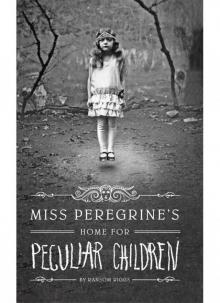 Miss Peregrine's Home for Peculiar Children
Miss Peregrine's Home for Peculiar Children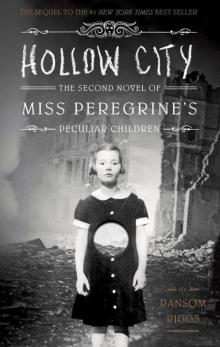 Hollow City
Hollow City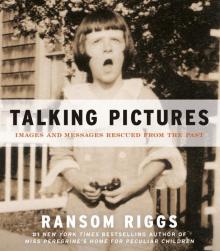 Talking Pictures: Images and Messages Rescued From the Past
Talking Pictures: Images and Messages Rescued From the Past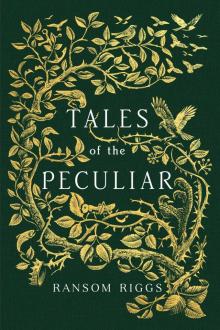 Tales of the Peculiar
Tales of the Peculiar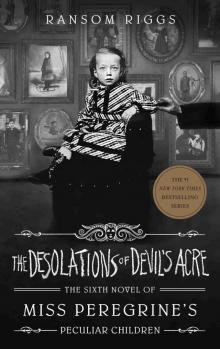 The Desolations of Devil's Acre
The Desolations of Devil's Acre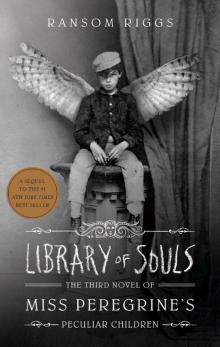 Library of Souls
Library of Souls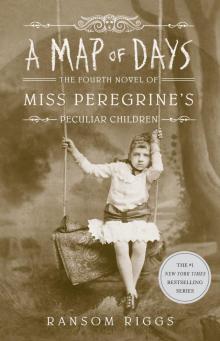 A Map of Days
A Map of Days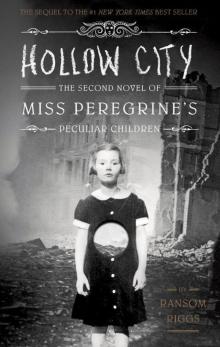 Hollow City: The Second Novel of Miss Peregrine's Peculiar Children
Hollow City: The Second Novel of Miss Peregrine's Peculiar Children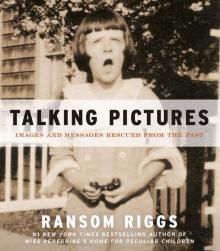 Talking Pictures
Talking Pictures